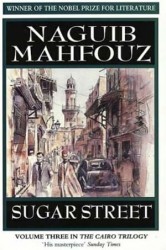 Sugar Street
Sugar Street
The Cairo Trilogy #3
by Naguib Mahfouz
Published by Doubleday
Published December 1, 1991.
Fiction
308 pgs. • Find on Amazon.com
Reviewed by Stephen O. Murray
July 17, 1994.
I find the objectivist (not just detached) observer of Naguib Mahfouz’s 1957 novel Sugar Street off-putting. Dare I say that it was old-fashioned even in 1957? Perhaps not in that the novel has not been a major Arabic genre, and Mahfouz was developing it.
The narration is not omniscient. It is close to being behaviorist. And it is rather discrete. There is no sex, homosexual or heterosexual, though Ridwan (p.284) and Abd al-Rahim Pasha Isa (p.278) declare their lack of desire for women and seem part of a homosexual coterie. Marriage-resistant son (low-level bureaucrat and unambitious Kamal) frequents a bordello run by the woman (Jalila) who was once his father’s favorite. (Frequenting prostitutes is what I think Abd al-Muni’m means when, in answer to his father’s question why can other youth wait to marry, he replies,” I’m not willing to do what they do” (p. 108).
Even with the backdrop of anti-colonialism, rising Islamic fundamentalism, and WWII, I find the selection of what to report about the characters’ lives unengaging. Frequently, what the characters say does not seem in character (that is, they seem to be mouthpieces for the author’s crypto-socialist views of the politics of the 1940s).
There is more debate than drama. The grandchildren of the patriarch/merchant Ahmad Abd al-Jawad from the first volume, Abd al-Muni’m and Ahmad—“the Believer and the apostate” (Islamist member of the Muslim Brotherhood and secularist Marxist)—are both arrested in the last parts of the book.
The frequently becalmed “narrative” lurches forward a few years at several points. Perhaps the prose is less pedestrian in Arabic than in the English translation? And such story is there is in the trilogy is not really brought to closure in Sugar Street… and Nasser’s overthrow of the monarchy is still eight years ahead at the end of the book in upheavals of 1944 (it commences in 1935).
A Nobel Prize for Literature winner in 1988, Mahfouz was born in Cairo in 1911 and died there in 2006.
©1994, 2016, Stephen O. Murray
17 July 1994

